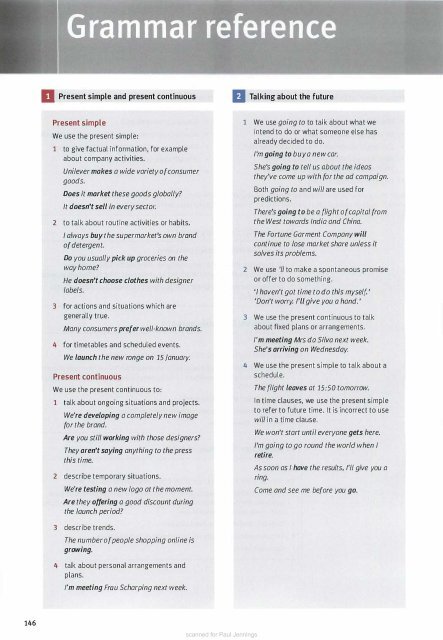Market Leader Intermediate 3rd edition SB
You also want an ePaper? Increase the reach of your titles
YUMPU automatically turns print PDFs into web optimized ePapers that Google loves.
II Present simple and present continuous<br />
II Talking about the future<br />
Present simple<br />
We use the present simple:<br />
1 to give factual information, for example<br />
about company activities.<br />
Unilever makes a wide variety of consumer<br />
goods.<br />
Does it market these goods globolly?<br />
It doesn't sell in every sector.<br />
2 to talk about routine activities or habits.<br />
I always buy the supermarket's own brand<br />
of detergent.<br />
Do you usually pick up groceries an the<br />
way home?<br />
He doesn't choose clothes with designer<br />
labels.<br />
3 for actions and situations which are<br />
generally true.<br />
Mony consumers prefer well-known brands.<br />
4 for timetables and scheduled events.<br />
We launch the new range on 15 January.<br />
Present continuous<br />
We use the present continuous to:<br />
1 talk about ongoing situations and projects.<br />
We're developing a completely new image<br />
fo r the brand.<br />
Are you still working with those designers?<br />
They aren't saying anything to the press<br />
this time.<br />
2 describe temporary situations.<br />
We're testing a new logo at the moment.<br />
Are they offering a goad discount during<br />
the launch period?<br />
1 We use going to to talk about what we<br />
intend to do or what someone else has<br />
already decided to do.<br />
I'm going to buy a new car.<br />
She's going to tell us about the ideas<br />
they've come up with fo r the ad campaign.<br />
Both going to and will are used for<br />
predictions.<br />
There's going to be a flight of capital from<br />
the West towards India and China.<br />
The Fortune Garment Company will<br />
continue to lose market share unless it<br />
solves its problems.<br />
2 We use 'II to make a spontaneous promise<br />
or offer to do something.<br />
'I haven't got time to do this myself '<br />
'Don't worry. I'll give you a hand. '<br />
3 We use the present continuous to talk<br />
about fixed plans or arrangements.<br />
I'm meeting Mrs do Silva next week.<br />
She's arriving on Wednesday.<br />
4 We use the present simple to talk about a<br />
schedule.<br />
The flight leaves at 15:50 tomorrow.<br />
In time clauses, we use the present simple<br />
to refer to future time. It is incorrect to use<br />
will in a time clause.<br />
We won't start until everyone gets here.<br />
I'm going to go round the world when I<br />
retire.<br />
As soon as I have the results, I'll give you a<br />
ring.<br />
Come and see me before you go.<br />
3 describe trends.<br />
The number of people shopping online is<br />
growing.<br />
4 talk about personal arrangements and<br />
plans.<br />
I'm meeting Frau Scharping next week.<br />
146<br />
scanned for Paul Jennings


